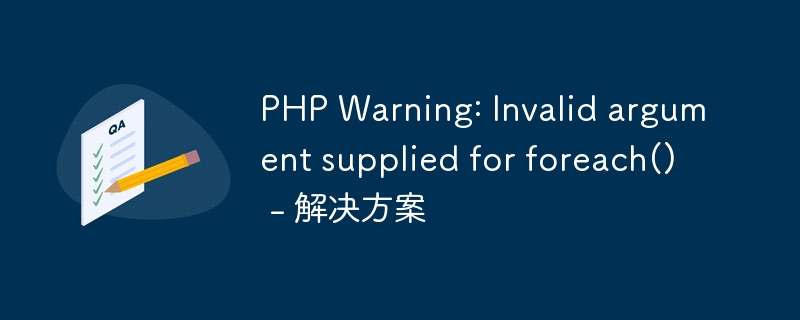

PHP Warning: Invalid argument supplied for foreach() - Solution
When using PHP to develop web pages or applications, you often encounter various errors and warnings . One of the common warnings is "Invalid argument supplied for foreach()", which is usually produced when using a foreach loop to iterate over an array. This problem seems simple, but if not solved in time, it may cause other errors or cause the program functionality to be affected. In this article, I will introduce you to some common ways to solve this problem.
First, we need to understand how this warning is generated. When using a foreach loop to traverse an array, if the given argument is not an array or a non-traversable object, the warning "Invalid argument supplied for foreach()" will appear. This situation usually occurs in the following situations:
The following are some common ways to solve this problem Method:
Before using the foreach loop, we should first check whether the parameter is empty. The following is a sample code:
if (!empty($array)) {
foreach ($array as $item) {
// do something
}
}This code first uses the empty() function to determine whether the parameter $array is empty. If it is not empty, the foreach loop is executed. This avoids warnings due to empty parameters.
We can use the is_array() function to check whether the parameter is an array. The following is a sample code:
if (is_array($array)) {
foreach ($array as $item) {
// do something
}
}This code first uses the is_array() function to determine whether the parameter $array is an array. If it is an array, the foreach loop is executed. This avoids warnings because the argument is not an array.
In PHP 7 and above, we can use type constraints to ensure that the parameters are arrays. The following is a sample code:
function processArray(array $array) {
foreach ($array as $item) {
// do something
}
}In this sample code, the parameter of the function processArray() uses the type constraint array, which means that the function will execute the foreach loop only when the parameter is an array. If the parameter is not an array, an error will be reported when calling the function.
If we cannot determine the type of the parameter, or do not want the entire program to crash because of an error in one parameter, we can use try- catch block to catch exceptions. The following is a sample code:
try {
foreach ($array as $item) {
// do something
}
} catch (Throwable $e) {
// handle the exception
}In this sample code, we put the foreach loop in the try block. If an exception occurs, it will be caught by the catch block. We can handle exceptions or give friendly error messages in catch blocks.
Summary:
The warning "Invalid argument supplied for foreach()" is a common problem that occurs when using a foreach loop to traverse an array. It usually occurs when the parameter is null, is not an array, or is a non-traversable object. We can solve this problem by checking whether the parameter is null or an array, using type constraints or using a try-catch block. The methods mentioned above are just some common solutions, and the specific solutions should be determined according to the specific code and scenarios. Hope this article can help you solve this problem and make your PHP program more stable and reliable.
The above is the detailed content of PHP Warning: Invalid argument supplied for foreach() - Solution. For more information, please follow other related articles on the PHP Chinese website!